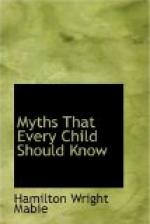But, when the affairs of his kingdom were all settled, King Thasus laid aside his purple robe, and crown, and sceptre, and bade his worthiest subject distribute justice to the people in his stead. Then, grasping the pilgrim’s staff that had supported him so long, he set forth again, hoping still to discover some hoof mark of the snow-white bull, some trace of the vanished child. He returned, after a lengthened absence, and sat down wearily upon his throne. To his latest hour, nevertheless, King Thasus showed his true-hearted remembrance of Europa, by ordering that a fire should always be kept burning in his palace, and a bath steaming hot, and food ready to be served up, and a bed with snow-white sheets, in case the maiden should arrive, and require immediate refreshment. And though Europa never came, the good Thasus had the blessings of many a poor traveller, who profited by the food and lodging which were meant for the little playmate of the king’s boyhood.
Telephassa and Cadmus were now pursuing their weary way, with no companion but each other. The queen leaned heavily upon her son’s arm, and could walk only a few miles a day. But for all her weakness and weariness, she would not be persuaded to give up the search. It was enough to bring tears into the eyes of bearded men to hear the melancholy tone with which she inquired of every stranger whether he could tell her any news of the lost child.
“Have you seen a little girl—no, no, I mean a young maiden of full growth—passing by this way, mounted on a snow-white bull, which gallops as swiftly as the wind?”
“We have seen no such wondrous sight,” the people would reply; and very often, taking Cadmus aside, they whispered to him, “Is this stately and sad-looking woman your mother? Surely she is not in her right mind; and you ought to take her home, and make her comfortable, and do your best to get this dream out of her fancy.”
“It is no dream,” said Cadmus. “Everything else is a dream, save that.”
But, one day, Telephassa seemed feebler than usual, and leaned almost her whole weight on the arm of Cadmus, and walked more slowly than ever before. At last they reached a solitary spot, where she told her son that she must needs lie down, and take a good, long rest.
“A good, long rest!” she repeated, looking Cadmus tenderly in the face—“a good, long rest, thou dearest one!”
“As long as you please, dear mother,” answered Cadmus.
Telephassa bade him sit down on the turf beside her, and then she took his hand.
“My son,” said she, fixing her dim eyes most lovingly upon him, “this rest that I speak of will be very long indeed! You must not wait till it is finished. Dear Cadmus, you do not comprehend me. You must make a grave here, and lay your mother’s weary frame into it. My pilgrimage is over.”
Cadmus burst into tears, and, for a long time, refused to believe that his dear mother was now to be taken from him. But Telephassa reasoned with him, and kissed him, and at length made him discern that it was better for her spirit to pass away out of the toil, the weariness, the grief, and disappointment which had burdened her on earth, ever since the child was lost. He therefore repressed his sorrow, and listened to her last words.




